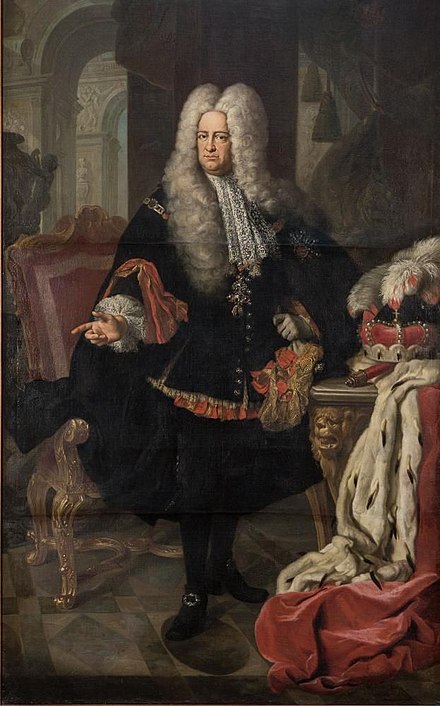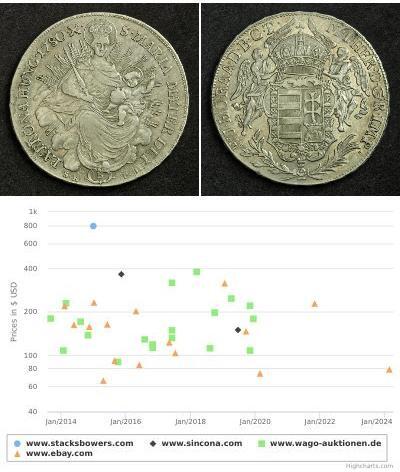1/4 Carolin Holy Roman Empire (962-1806) Charles III Philip
1736/1, Pfalz (Electoral), Charles III Philipp. Gold 1/4 Karolin Coin
Mint Place: Mannheim
Denomination: Gold 1/4 Carolin
References: Friedberg 2031, KM-260. Rare overdate variety, shown in KM without valuation!
Mint Year: 1736 (last digit re-engraved from 1, suggesting that the modified dies for the 1731 issue were used also for the striking of this specimen in 1736!)
Material: Gold (.770)
Diameter: 18mm
Weight: 2.41gm
Obverse: Head of Charles III Philip as Elector Paletine right.
Legend: PHILIP . D . G . EL . PALATINUS 1736/1
Reverse: Crowned cruciform monographs of Charles III Philip around oval coat-of-arms.
Legend: MONE . NOVA . AUREA . PALATI .
 The Electoral Palatinate (German: Kurpfalz) or the Palatinate (Pfalz), officially the Electorate of the Palatinate (Kurfürstentum Pfalz), was a state that was part of the Holy Roman Empire.1 The electorate had its origins under the rulership of the Counts Palatine of Lotharingia from 915, it was then restructured under the Counts Palatine of the Rhine in 1085. These counts palatine of the Rhine would serve as prince-electors (Kurfürsten) from “time immemorial”, and were noted as such in a papal letter of 1261, they were confirmed as electors by the Golden Bull of 1356.
The Electoral Palatinate (German: Kurpfalz) or the Palatinate (Pfalz), officially the Electorate of the Palatinate (Kurfürstentum Pfalz), was a state that was part of the Holy Roman Empire.1 The electorate had its origins under the rulership of the Counts Palatine of Lotharingia from 915, it was then restructured under the Counts Palatine of the Rhine in 1085. These counts palatine of the Rhine would serve as prince-electors (Kurfürsten) from “time immemorial”, and were noted as such in a papal letter of 1261, they were confirmed as electors by the Golden Bull of 1356.
The territory stretched from the left bank of the Upper Rhine, from the Hunsrück mountain range in what is today the Palatinate region in the German federal state of Rhineland-Palatinate and the adjacent parts of the French regions of Alsace and Lorraine (bailiwick of Seltz from 1418 to 1766) to the opposite territory on the east bank of the Rhine in present-day Hesse and Baden-Württemberg up to the Odenwald range and the southern Kraichgau region, containing the capital cities of Heidelberg and Mannheim.
The counts palatine of the Rhine held the office of imperial vicars in the territories under Frankish law (in Franconia, Swabia and the Rhineland) and ranked among the most significant secular Princes of the Holy Roman Empire. In 1541 elector Otto Henry converted to Lutheranism. Their climax and decline is marked by the rule of Elector Palatine Frederick V, whose coronation as king of Bohemia in 1619 sparked the Thirty Years' War. After the 1648 Peace of Westphalia, the ravaged lands were further afflicted by the “Reunion” campaigns launched by King Louis XIV of France, culminating in the Nine Years' War (1688–97). Ruled in personal union with the Electorate of Bavaria from 1777, the Palatinate was finally disestablished with the German mediatization and annexation by Baden on 27 April 1803.
 Charles III Philip (4 November 1661 – 31 December 1742) was Elector Palatine, Count of Palatinate-Neuburg, and Duke of Jülich and Berg from 1716 to 1742. Until 1728 he was also Count of Megen.
Charles III Philip (4 November 1661 – 31 December 1742) was Elector Palatine, Count of Palatinate-Neuburg, and Duke of Jülich and Berg from 1716 to 1742. Until 1728 he was also Count of Megen.
Born in Neuburg an der Donau, Charles Philip was the seventh of 17 children of Philip William, Elector Palatine and Elisabeth Amalie of Hesse-Darmstadt.
Though Charles Philip became a cleric in Cologne at the age of fourteen in 1677 in Salzburg, and again in 1679 in Mainz, he was not ordained but instead started a military career in 1684. He then joined the Habsburg war against the Turks 1691–1694 and was promoted imperial field marshal. In 1712 he was appointed Governor of Further Austria in Innsbruck.
Charles Philip succeeded his brother Johann Wilhelm, Elector Palatine on his death in 1716. He moved the Palatinate’s capital from Heidelberg to the new city of Mannheim in 1720, but not before promoting his favorite court jester, Perkeo of Heidelberg, to be in charge of the castle’s wine stocks. To strengthen the union of all lines of the Wittelsbach dynasty Charles Philip organized a wedding on 17 January 1742 when his granddaughter Elizabeth Auguste was married to Charles Theodore of Palatinate-Sulzbach and her sister Maria Anna to the Bavarian prince Clement. In the imperial election a few days later Charles III Philip voted for his Bavarian cousin Prince-Elector Charles Albert.
Upon his death in December 1742, the Palatinate-Neuburg line became extinct, and the Electorate of the Palatinate (including Neuburg, Jülich and Berg) was inherited by Charles Theodore of the Palatinate-Sulzbach line of the Wittelsbach family. Another granddaughter of Charles Philip, Countess Palatine Maria Franziska of Sulzbach, was later married to Count Palatine Frederick Michael of Zweibrücken. Their son Maximilian I Joseph of Palatinate-Zweibrücken became the heir of the Palatinate-Sulzbach line.
While in Mannheim, Charles III Philip, and later his successor Charles IV Theodore, put together what was commonly regarded as the finest orchestra in all of Europe. Under the leadership of musicians such as Johann Stamitz and Carlo Grua, the orchestra of the Kapelle was lauded by such musicians such as Leopold and Wolfgang Amadeus Mozart.
(3205 X 1531 pixels, file size: ~699K)
Posted by: anonymous 2023-10-31
1736/1, Pfalz (Electoral), Charles III Philipp. Gold 1/4 Karolin Coin. NGC AU55! Mint Place: Mannheim Denomination: Gold 1/4 Carolin Condition: Certified and graded by NGC as AU-55! References: Friedberg 2031, KM-260. Rare overdate variety, shown in KM without valuation! Mi ...
1 Grivennik Russian Empire (1720-1917) Silver Catherine II ( ...
group has 25 coins / 22 prices
⇑

-500-250-P25nnOFs0zUAAAGLe20X6YNn.jpg)
-300-150-P25nnOFs0zUAAAGLe20X6YNn.jpg)






-300-150-MgAKbzbigA0AAAFNTshtvw0i.jpg)







